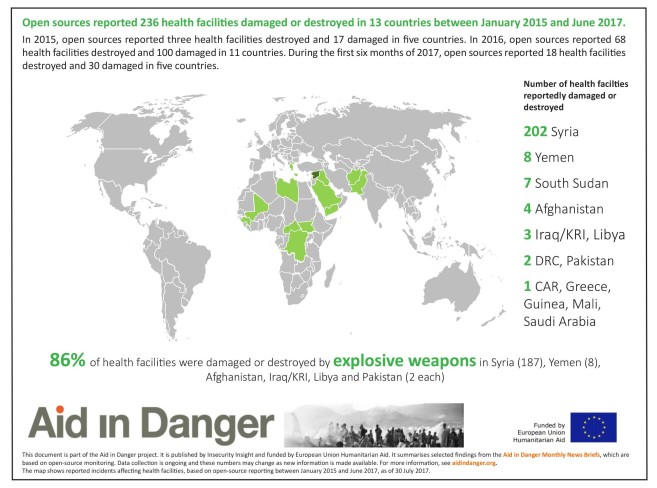World Humanitarian Day, marked every year on 19 August, is dedicated to humanitarian workers who risk their lives to deliver aid, and serves as an occasion to highlight the needs of people living through crisis situations. This date was chosen because on 19 August 2003, twenty-two UN staff were killed in the bombing of the UN headquarters in Baghdad, Iraq. Since then, the use of explosive weapons has continued to have a severe impact on the delivery of humanitarian aid.
New data from Insecurity Insight’s Aid in Danger project indicates that more than half of aid workers reported killed and injured between January and June 2017 were casualties of explosive weapons. This is an increase on 2013, when the proportion was around 30% – suggesting that humanitarian personnel are being put in more and more danger by the use of explosive weapons in the areas where they work.
Insecurity Insight’s monitoring of events that hinder the delivery of humanitarian aid, based on open sources as well as confidential reports from humanitarian agencies, also shows that of the incidents of healthcare facilities destroyed that were recorded, 86% of cases were due to the use of explosive weapons. For ambulances destroyed, the proportion was 92%.

The use of explosive weapons in populated areas poses severe risks and causes serious harm to civilians living through conflict, endangering humanitarian workers and work to assist them in turn.
The UN’s #NotATarget campaign for World Humanitarian Day this year emphasises the protection of civilians, including humanitarian aid workers, with a petition urging world leaders to, amongst other demands, “protect civilians in cities and towns, as well as their homes and the essential services they rely on.” A key step that states could take to fulfil this would be to stop the use of explosive weapons with wide area effects in populated areas, as these weapons pose the greatest risks to civilians and civilian infrastructure.
As the petition notes, airstrikes and shelling drive people from their homes. The use of explosive weapons in populated areas also causes deaths and injuries, the destruction of vital infrastructure, and makes cities and towns unsafe to return to due to explosive remnants of war. Even if parties to conflict do not deliberately target civilians or civilian infrastructure, the use of explosive weapons in populated areas can cause significant damage and harm, particularly where wide area effect weapons are used, due to the nature of these weapons and of urban environments.
States must commit to concrete action to address this pressing humanitarian issue.
